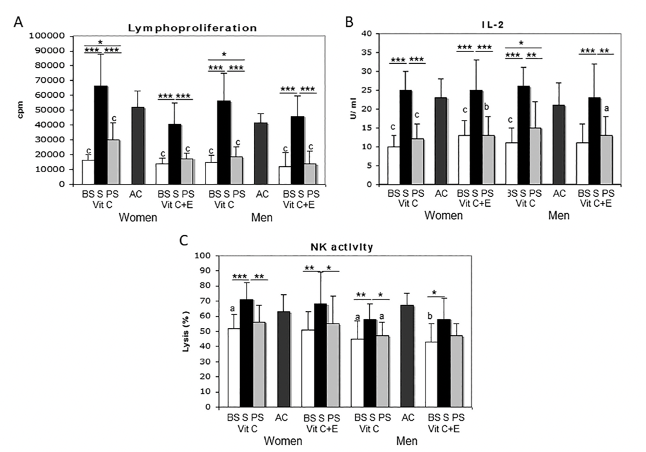With aging, the immune response is impaired. This immunosenescence, in which an alteration in the redox status of immune cells appears, is involved in the rate of aging.
Since leukocyte function is a good marker of health and a predictor of longevity, one study investigated the effects of dietary supplementation with the antioxidant vitamin E (200 mg) per day on the functions of several blood neutrophil, lymphocyte, and natural killer cell in healthy elderly men and women before supplementation, 3 months after supplementation, and 6 months after the end of supplementation. These findings suggest that vitamin E supplementation can produce improvements in immune functions, and can improve the health of older adults.
Another updated experiment investigated the effects of daily oral administration of antioxidant vitamin C (500 mg), or both vitamin C (500 mg) and vitamin E (200 mg) on the functions of several blood neutrophil (adherence, chemotaxis, phagocytosis, and superoxide anion levels) and lymphocyte (adherence, chemotaxis, proliferation, interleukin-2 secretion, and natural killer activity) in healthy elderly men and women before supplementation, 3 months after supplementation, and 6 months after the end of supplementation. The results showed that in elderly participants, vitamin C improved the immune function studied, achieving values close to those of younger adults. After 6 months without supplementation, these effects were maintained in some of the functions.
In conclusion, a short period of vitamin C or vitamin C and E ingestion, with the dosages used, can improve immune function in elderly men and women, contributing to healthy longevity.

De la Fuente, M., Hernanz, A., Guayerbas, N., Victor, V. M., & Arnalich, F. (2008). Vitamin E ingestion improves several immune functions in elderly men and women. Free radical research, 42(3), 272–280. [Link]
De la Fuente, M., Sánchez, C., Vallejo, C., Díaz-Del Cerro, E., Arnalich, F., & Hernanz, Á. (2020). Vitamin C and vitamin C plus E improve the immune function in the elderly. Experimental gerontology, 142, 111118. [Link]
